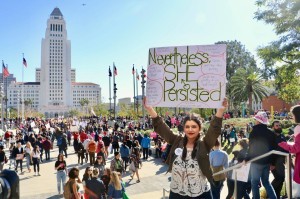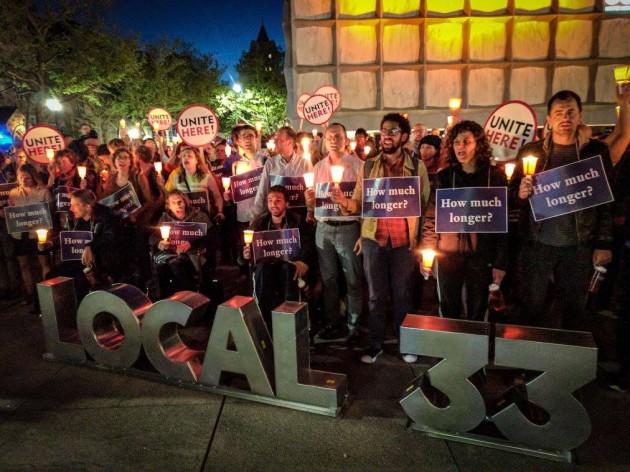Author Archives: Mindy Isser
August 29, 2018 by Mindy Isser
Four Labor Reforms Feminists Should Be Fighting For This Year
In the US, Labor Day is generally just seen as a day off work (for the lucky ones!) reserved for cookouts and to say goodbye to summer.
But for women and caregivers of all genders, our labor is never-ending, and rarely appreciated. Outside of the home, women make less than men—for the same work— while women of color make even less than white women. Inside the home and even at work, our work is invisible, unpaid, and often thankless.
 That’s why this Labor Day we’re going to highlight four ideas and policies that would improve the lives of working women across the country. All of these are completely doable, by the way–if we just have the imagination and courage to fight for them.
That’s why this Labor Day we’re going to highlight four ideas and policies that would improve the lives of working women across the country. All of these are completely doable, by the way–if we just have the imagination and courage to fight for them.
- No Comments
March 5, 2018 by Mindy Isser
Why Sending Pizza to West Virginia’s Striking Teachers Is a Mitzvah

Teachers in San Francisco sent pizza to the picket lines to support the strike. Here, the moment when the food arrives. Photo credit: Eric Blanc.
Like most leftists and other concerned humans, I’ve been following the West Virginia teachers strike as closely as I can. Today marks the eighth day of their illegal strike—in West Virginia, public employees lack both the right to strike and to bargain collectively. But teachers and other public school workers went on strike anyway, because their pay ranks 48th in the country, and their health insurance premiums continue to increase. They’re promising to remain on strike until a law is passed guaranteeing them a 5% raise.
Like thousands of others, I donated to the strike fund, but it didn’t feel like this was enough—so I ordered pizza.
As a Jew, I emote with food. Bad breakup? Made it out of surgery? Had a baby? I’m on my way over with food. Whatever it is, there’s something about feeding someone that communicates everything you need to say—and, sometimes, the things you can’t say.
In my family—and I imagine, in many Jewish families just like mine—everything we do revolves around food, and most of my family memories are food-related. When I think of my bubby, I think of her in my childhood kitchen, chopping carrots with bandaged fingers; or in her apartment in Atlantic City, roasting chicken til the skin got crispy; in the morning, eating oranges, sliced into perfect, golden triangles; at lunch, tuna fish sandwiches with Jersey tomatoes.
When she saw me and my siblings, the first thing she’d ask is if we were hungry. And we were, always. And when we were done, she’d say, did you have enough to eat? My bubby wasn’t fancy, but everything she cooked tasted better than anything else. When we left, she hugged us tight and let us stuff our pockets with the candy reserved for her card games.
But feeding people is not just a kindness, it’s a mitzvah. For Jews, food is a celebration, yes, but it’s also obligatory. We’re commanded to feed ourselves and those around us—especially after the fulfillment of a ritual or an important life event. Sharing a meal celebrates our connectedness both to ourselves and to God.
- No Comments
June 6, 2017 by Mindy Isser
Jewish Women on the Ramparts for Graduate-Worker Unions

Yale University graduate students at a vigil for the hunger fast. (Photo from Local 33-Unite Here’s Facebook page).
“It’s not something I ever thought I’d have to do to get the university I attend, and work at, to follow the most basic labor law,” said Lena Eckert-Erdheim. She’s a graduate student worker at Yale University, and she’s talking about her eight-day fast, part of the #FastAgainstSlow. Though she wasn’t raised in a religious family, Eckert-Erdheim said that for her “fasting has a spiritual element to it… it’s an act that speaks very powerfully to many traditions.”
Why did Eckert-Erdheim decide to go on a hunger strike? In February, eight of the nine departments at Yale whose graduate student workers voted on whether to join a union, voted yes. However, the administration has refused to acknowledge—let alone negotiate with—the union. Instead, they have appealed the vote to National Labor Relations Board (NLRB). Graduate workers are seeking, among other things, improved child care, better health care, and a sexual harassment grievance procedure. In response to the administration’s continued refusal to negotiate, grad workers at Yale embarked on the hunger strike that Eckert-Erdheim participated in, which lasted until Yale’s commencement on May 22.
- No Comments
March 14, 2017 by Mindy Isser
Why We Need to Teach Tzedek, Not Just Tzedekah

Tzedekah pouch. Photo credit: Cheskel Dovid.
Growing up, I spent a lot of time in my Conservative synagogue—my parents prioritized Jewish learning, and so I spent two afternoons and one morning a week in Hebrew school. Nothing about adolescence has shaped me as much as those classes, where I learned an incredible amount about Judaism, the limits of liberalism, and myself.
My biggest learning memory—outside of beginning to understand the depths of horror of the Holocaust—is around tzedakah, charity. We often did our morally obligated good deeds together as a class: volunteered at homeless shelters, delivered groceries to senior citizens, and put quarters in the tzedakah box (which is a lot when you’re in middle school!) We would talk about how we felt afterward—nervous and guilty, yet righteous—and how important it is to “give back,” both because God commands it and also just because it’s the “right thing to do.”
But many things are the “right thing to do,” including fighting for unions in the workplace, for a world without refugees, and for an economic and political system that works for all of us. Although there was intense focus on tzedakah, I don’t remember learning about tzedek, the root word of tzedekah—justice, the lifeblood of Jewish history and resistance.
- 1 Comment
 Please wait...
Please wait...